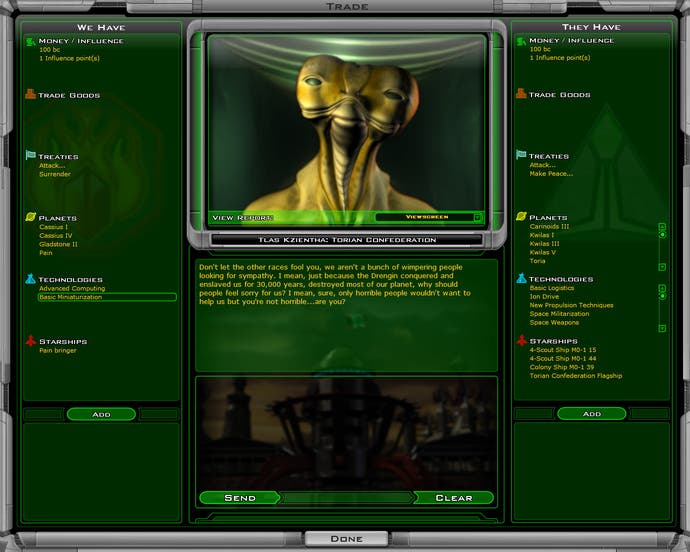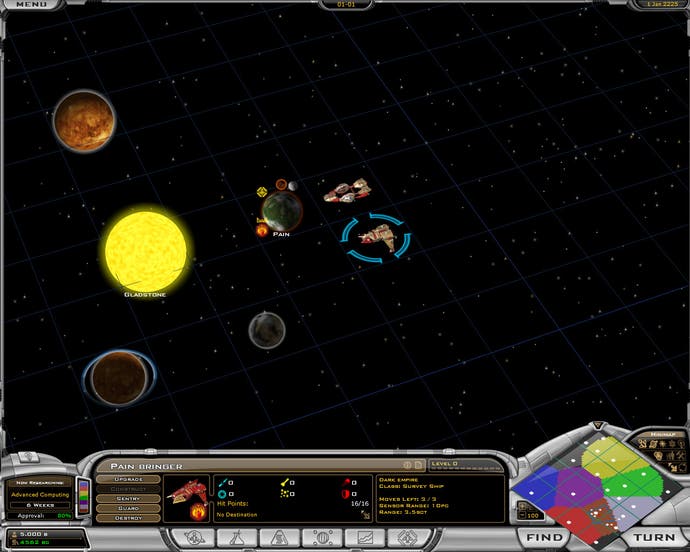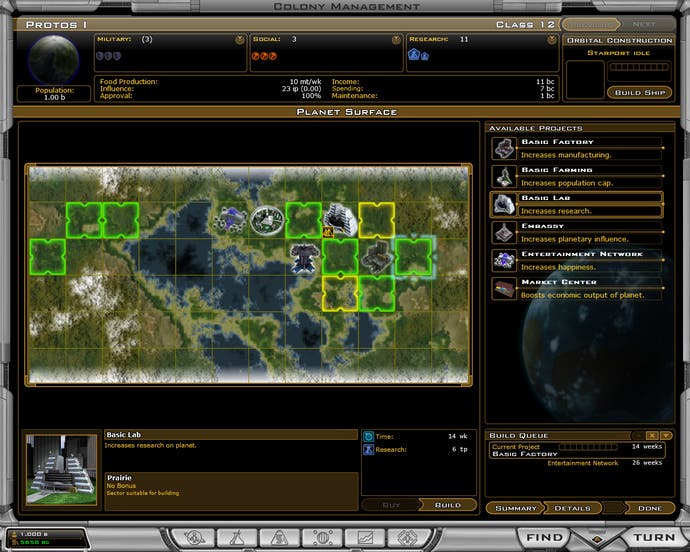Galactic Civilizations II: Dread Lords
Natty Dread.
The success of the last Galactic Civilizations was hailed as a David and Goliath situation, where Galactic Civilizations managed to out-perform the money-draped Master of Orion III. In the towering Goliath corner, a team whose art department was "only" five people. In the David corner, a whole development team less than five people. While the details of the victory were somewhat less than stirring - in the same way the Biblical David and Goliath story would have been less impressive if David's victory was secured by Goliath walking onto the battlefield, immediately throwing himself off a cliff while punching himself repeatedly in the face - GalCiv was exactly what the space-exploration empire-building beard-sporting kids wanted. A big, complicated, dedicated, intelligent game of universal domination.
And lo! It was good. And lo! It sold. And lo! Here's its sequel.
Conceptually, it's thankfully very similar ground, which is to be expected. (After all, Stardock's savvy enough not to introduce things like wandering off to have a look at what's in that field over there design-geographically speaking, which was part of MOO3's failings.) Playing one of the game's space races, you get into a race in space to dominate the universe, however you choose. From your initial planets, you send out colony ships to take over uninhabited worlds, develop your available landspace, build armies to conquer, merchant transporters to trade, engage in simple-yet-powerful diplomacy between your peer group, and research the proverbially sprawling tech tree.

There's a lot to do. There really is. It's the sort of game where the manual isn't something to pad out the game-box, but rather absolutely essential to providing the requisite infodump to play the bally thing. The game regularly stresses Douglas Adams' observation that space is big. Well, if Mr Adams was alive today and played GalCiv 2, he'd probably add the rider "as is Galactic Civilizations 2". And, if he played the narrative campaign, which offers a neat series of challenge missions to play through, he may add "and the Dread Lords are absolute Basts".
In terms of new additions, what's more immediately noticeable is the use of 3D graphics rather than the plain flat world of old, and while it's unlikely to feature alongside the painterly scenes from Shadow of the Colossus as an example of the subtle universes it's possible to construct in videogames, GalCiv 2's far more aesthetically pleasing. Spinning around the map, zooming out to get the bigger picture, zooming in to have a look at the fins of your spaceships - it's functional. For a game like this, functional is what really matters.
Another welcome improvement is the ship constructor. Rather than being stuck with basic ship models, you're able to construct your own. Each hull you research has a variable amount of space, which you can fill with engines, armour, weapons and the various components that make up a self-respecting interplanetary vessel. The tactical considerations for maximising your fleet's abilities will devour almost as many hours as the ability to add knobbly, attractive and entirely unfunctional bits FOR FREE onto each vessel. The mixture of hard strategy and gadabout feyness is generally inspiring.
Oh - a few special words for the AI, which is simply exemplary. I've spent much of the time playing it feeling really stupid, in much the same way you feel dumb when your partner comes in and points out that what you've been doing to clean the kitchen is both terribly inefficient and actually totally ineffective, and rather you should be doing this. It plays viciously, yet doesn't appear to cheat. It just seems to be better at the game than you are which is exactly how it should be.

It's big. Big and good. Big and good and big. And good.
And big.
Yes.
What prevents this getting the 9 harks back to what I said earlier. For a game like this, functional is what really matters and there's assorted elements that conspire to make it less functional than you'll wish. For a start, it's particularly hard to get into. The tutorials are videos you watch, explaining the mechanisms and all set outside the engine itself as you may have become accustomed to. While this will give you the basics of how to interact, you're left struggling in terms of actually having a clue how to play the game. Often it's a little like having a driving instructor explaining what all the various levers in the car are for then leaving you to it.
While learning on the job is one thing - and while the AI will punish you for your errors, watching what it does is the best way to pick up basic strategy - when you're left to puzzle out particularly obfuscatory mechanics by yourself it's somewhat less than ideal. For example, its production mechanisms are considerably different from many turn-based games you'll have played, with factories equalling maximum production rather than a bonus which... oh, you don't really need to know the mechanics for a review. Hell - on a train journey with Walker a few days ago, I filled him with fear by reading out sections of the Galactic Civilization 2 manual casually mentioning that the bonus for one thing is the square root of another (which isn't to say that despite its space being full of numbers, the game's cold in any way).
On the contrary, GalCiv 2 has real personality and a distinctive atmosphere, with explanatory texts of a situation often being genuinely witty and playful. Special mention must be made to the computer AI, when set on lower levels, will complain that they'd be able to beat you if only they were turned on properly. As far as turn-based go, that's class.

The second problem is some general twitchiness around the interface. Many elements exist to make ruling your possibly massive civilization easier, but others are obscured. Managing fleets of ships occasionally proves tricky, in terms of wanting to interact with one member of a fleet. For example, setting a rally point over a planet pretty much makes selecting the planet impossible, and while setting rally points for construction queues is easy to manage via Governors, initially getting to it seems buried several screens into the interface.
And so on... none of these are fatal, but they're slow abrasions against your experience.
You sense that this is going to be some people's game of the year. Hell, with the amount of actual game here, it's possible that could be in a purely literal sense: in that they won't bother playing anything else because this will happily occupy all the time you care to throw at it. If you're prepared to wrestle with the occasionally unfriendly interface and figure out the unintuitive systems, there's every chance you'll be one of them. Conversely, if you aren't... well, it's unlikely you'll be even reading this review; instead you'll be sitting on the news pages and desperately refreshing news about the latest update to Princess Pooble racing.
You want more? You're willing to pay in sweat, blood and tears to get back the thrill-induced sweaty palms as an unexpected invasion closes in on your largest colony, drink the fresh blood to this genre and shed tears of joy at the amount of sheer, unleashed games on display here? Well, you've read this far. It's unlikely that you'll let whatever mark that's just down the page from this stop you. And I wouldn't try to convince you otherwise.
Have fun.

